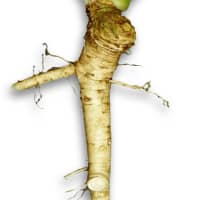Horseradish (Armoracia rusticana, syn. Cochlearia armoracia) is a root vegetable used as a spice. It is in the same family of plants as mustard, wasabi, broccoli, and cabbage (Brassicaceae).
Composition
- Horseradish and Wasabi contain the organosulfur glucosinolate compound, Allyl isothiocyanate.
Healing Properties
- Antimicrobial: Natural isothiocyanates (ITC) found in Horseradish express both high antimicrobial activity as well as blocking the pathogenic process of human cell penetration by uropathogenic E. coli (UPEC).[1]
- Antiviral: (anti-viral)
- Anticancer: (antitumoral, Antitumor) helps suppress he growth of tumors.
- Blood Health:
- Heart Health:
- Chemoprotective: increase the liver’s ability to detoxify chemicals and carcinogens.
Disease / Symptom Treatment
- Bacterial Infections:
- Urinary Tract Infection (UTI): Natural isothiocyanates (ITC) found in Horseradish express both high antimicrobial activity as well as blocking the pathogenic process of human cell penetration by uropathogenic E. coli (UPEC).[1:1]
Title: Treating urinary tract infections due to MDR E. coli with Isothiocyanates – a phytotherapeutic alternative to antibiotics?
Author(s): Nico T. Mutters, Anja Mampel, Rebecca Kropidlowski, Klaus Biehler, Frank Günther, Ioana Bălu, Veronika Malek, Uwe Frank
Institution(s): Institute for Infection Prevention and Hospital Epidemiology, Medical Center - University of Freiburg, Faculty of Medicine, University of Freiburg, Germany; Institute of Medical Microbiology and Hospital Hygiene, University of Marburg, Marburg, Germany; Heidelberg University Hospital, Centre for Infectious Diseases, Heidelberg, Germany
Publication: Fitoterapia
Date: September 2018
Abstract: Background Multidrug-resistant (MDR) bacteria are increasingly causing urinary tract infections (UTI), which has been linked to frequent use of antibiotics. Alternative treatment regimens are urgently needed and natural isothiocyanates (ITC) may represent one. ITCs are natural plant products found in nasturtium (Tropaeoli majoris herba) and horseradish (Armoraciae rusticanae radix).Purpose The objectives were to (1) assess the antimicrobial effects of nature-identical ITCs for UTI treatment caused by uropathogenic E. coli (UPEC), (2) to evaluate a potential influence of antimicrobial resistance on ITC susceptibility, and (3) to test whether ITCs affect UPEC penetration into human uroepithelial cells. Methods We tested 217 clinical UPEC isolates, 54.5% of which were classified as MDR, for susceptibility against ITCs. ITC susceptibility testing was performed by broth dilution using a mixture of three synthetic ITCs. Internalization was tested using human T-24 bladder carcinoma cells in an internalization assay co-incubated with UPEC (n = 5) and ITCs. Results The mean minimal inhibitory concentration (MIC) 90 was 0.17 mg/ml, showing very high susceptibility against ITCs. Interestingly, MDR E. coli were significantly less susceptible than non-MDR strains (p = .01). Internalization of UPEC was decreased by 31.9% in the mean when treated with ITCs. Overall, ITCs exerted a strong antimicrobial activity against clinical UPEC isolates and reduced internalization into uroepithelial cells. Conclusion ITCs might present a promising treatment alternative for UTIs, expressing both high antimicrobial activity as well as blocking the pathogenic process of human cell penetration by UPEC. Clinical studies, however, are needed to confirm activity of ITCs in UTIs in vivo.
Link: https://doi.org/10.1016/j.fitote.2018.07.012
Citations: ↩︎ ↩︎
